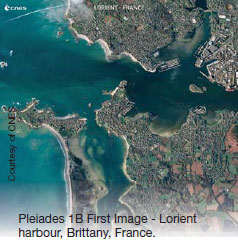Articles in the News Archives Category
NovAtel Inc., has added a new commercially exportable MEMS IMU (micro electromechanical inertial measurement unit) to its line of SPAN GNSS/INS products. It is supplied by Analog Devices (Norwood, Massachusetts) and is exclusive to NovAtel. It can be paired with an OEM6 receiver card to provide continuously available position, velocity, and attitude (roll, pitch, yaw) in a small, single-unit form factor.
Philipp Ronnenberg, a masters student in design interactions at the Royal College of Art in London, recently showed off the first prototype sensors for his alternate “Open Positioning System,” which are designed to pick up regular seismic waves given off by large machinery in nearby power plants and factories. Once a sensor detects at least three different nearby seismic wave sources, Ronnenberg theorizes it should be able to determine its location. So far, he’s built a prototype sensor using the Arduino open source hardware microcontroller, which he says “can detect and collect different frequencies.
A detailed assessment of the country’s mineral resources is required before mines are put up for bidding with the aim of revenue maximisation, said the Economic Survey. “In order to meet the objective of revenue maximisation in an open, transparent and competitive manner, this should be preceded by detailed geological mapping of the mineral wealth of the country,” said the Economic Survey 2012-13, tabled in Parliament. http:// articles.economictimes.indiatimes.com/
Europe’s two satellite navigation systems could combine in future for heightened performance, an airborne test has confirmed. A helicopter flight took place above an Alpine valley, the one place on Earth where Galileo services are already routinely available. Results of last autumn’s flight test show that adding Galileo signals to the European Geostationary Navigation Overlay Service – EGNOS – that currently augments the accuracy and reliability of US GPS signals over Europe should boost its accuracy significantly.
Fujitsu exhibited a prototype of its GPS-enabled walking stick at Mobile World Congress recently in Barcelona. The futuristic stick is aimed at getting older people out of the house, but would be equally at home slung over the arm of an Apple hipster while their iPod Nikes are in the wash. The user can configure their route on a PC before downloading it to the stick via Bluetooth. As you tap along the street, a display on the top of the stick shows you when to turn – removing the need to muck about with smartphone maps while you’re trying to pay attention to your surroundings. www.theregister.co.uk
A MoU was signed by the Valuation and Property Service Department (JPPH) and Malaysian Remote Sensing Agency (ARSM), JPPH director general Datuk Abd Hamid Abu Bakar said the collaboration was done based on the success of a pilot project in the federal territory in accelerating and improving the efficiency and effectiveness of the valuation process. He said the pilot project was successful and had an impact in accelerating and improving the efficiency and effectiveness in the proses of property evaluation. www.thesundaily.my
$3 billion generated by Indian geo services industry in 2011
The Indian geo services industry generated $3 billion in revenue in 2011 alone while accounting for approximately 1,35,000 jobs, according to a BCG report commissioned by Google. The report said that the impact of the geo services industry is valued at approximately 15 times it’s own size
Galileo’s search and rescue system passes fi rst space test
The first switch-on of a Galileo search and rescue package shows it to be working well. Its activation begins a major expansion of the space-based Cospas–Sarsat network, which brings help to air and sea vessels in distress. The second pair of Europe’s
New command successor for GPS Directorate
Col. William T. “Bill” Cooley will take up the role of Senior Materiel Leader at the Department of Defense (DoD) acquisition ofô€‚¿ ce for developing and producing GPS satellites, ground systems, and military user equipment. Cooley currently serves as the director of the Air Force Research Laboratory (AFRL) Space Vehicles Directorate and as the commander of the Phillips Research Site at Kirtland Air Force Base, New Mexico. www.marinelink.com/











 (5.00 out of 5)
(5.00 out of 5)